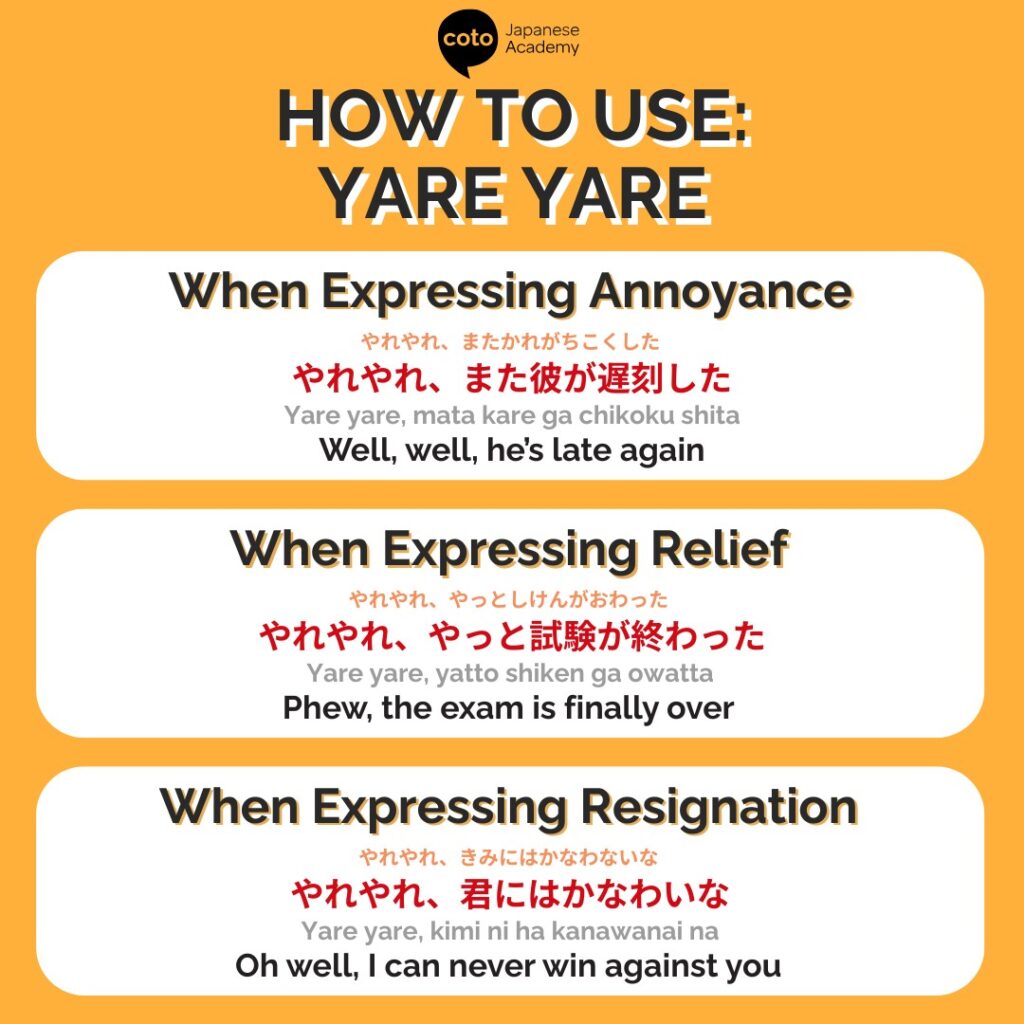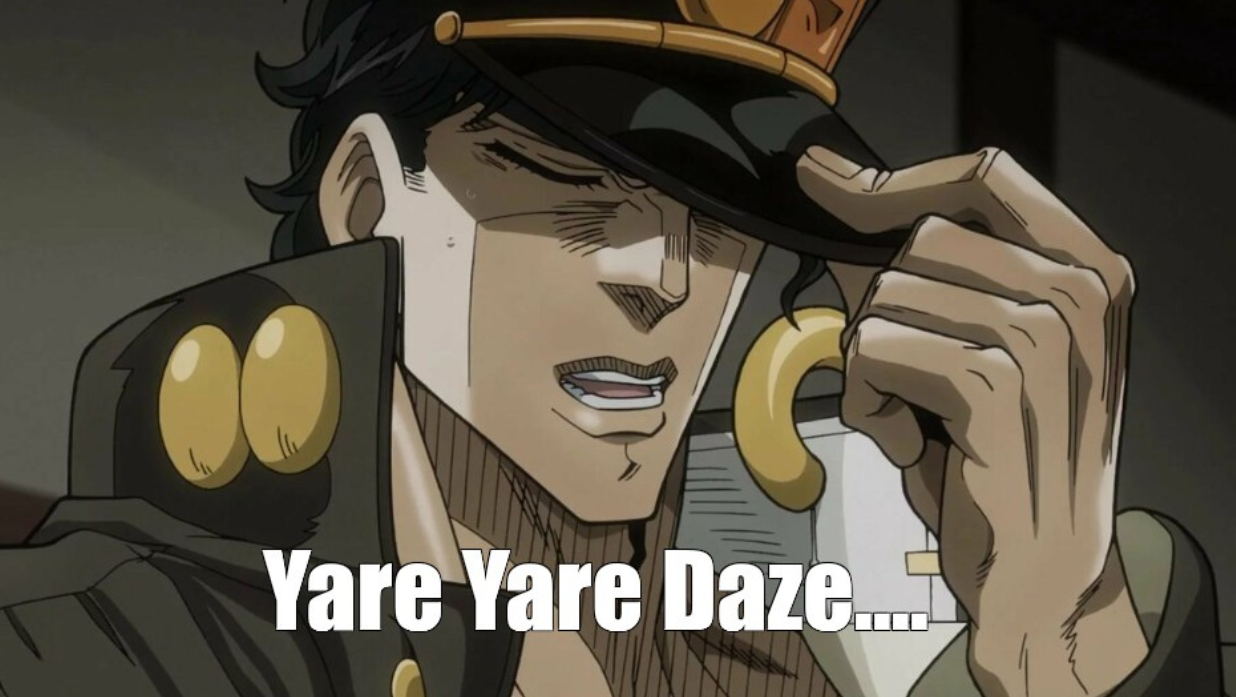やれやれ (yare yare)! You might recognize this iconic phrase dramatized in JoJo’s Bizarre Adventure. You probably remember the line from Jotaro Kujo, who exclaims the catchphrase whenever he’s annoyed or bored. Even for people who haven’t watched Jojo, the line has been immortalized as a trending internet image with the titular character holding his cap and the text saying “Yare Yare Daze”.
The famous catchphrase is translated to interpretations such as “well, well,” “good grief,” and “give me a break.” It is a common expression in Japan used to show disappointment and is also a sarcastic expression of feeling bad for the other person. But as cool or entertaining as it sounds in Jojo, what does it really mean, and how do you actually use it in natural Japanese conversation, if at all? Continue reading to find out!
Meaning of やれやれ (Yare Yare)

やれやれ (yare yare), as simple as it sounds, is a deceptively multi-layered phrase that can convey a variety of different expressions. Unlike a simple “oh well”, its most common English translation, yare yare, conveys emotion through context and tone. It can mean any of the following:
- Annoyance or exasperation: “Good grief…”
- Resignation: “Well, here we go again…”
- Relief after effort: “Phew, that’s over…”
- Subtle sarcasm: “Yeah, sure…”
Think of it as a phrase that carries a sigh inside of it. It’s basically an expression of disappointment, cathartic relief, or irony, either through sarcasm or playful teasing. Rather than finding a word-for-word translation, you can think of yare yare as a way of expressing a certain set of emotions that can apply to different situations.
Want to know more words that don’t have English equivalents? Read our blog introducing 21 Japanese words you can’t translate into English.
Origins of Yare Yare
The expression yare is an old Japanese interjection used in classical language to show emotion. It could mean “oh!”, “ah!”, or be used as a sigh of relief. Doubling the word into やれやれ gave it a rhythmic sound, softening it into something that feels like an audible sigh.
A common misconception is that やれやれ (yare yare) is an onomatopoeia. While it looks similar to onomatopoeic expressions (since it repeats the same word), it is actually an interjection (感動詞). Unlike onomatopoeia, it does not represent a sound or a state, and it cannot be used in the same grammatical way.
For example, onomatopoeic words can often be turned into verbs with する:
ドキドキする
Doki doki suru
To feel one’s heart pounding
But you cannot say やれやれする. やれやれ functions like other interjections, such as あの or ほら. It stands alone and conveys an attitude, like relief, resignation, or mild exasperation, rather than describing a sound or feeling.
You’ll find examples in older Japanese literature where yare yare was used in moments of relief after hardship or when a character resigned themselves to a situation. Over time, the phrase shifted into everyday language, carrying shades of “thank goodness,” “what a bother,” or “good grief.”
Today, it’s more common in casual speech, especially when expressing annoyance, mild frustration, or relief. Outside of Japan, it is most associated with the anime or manga, Jojo’s Bizarre Adventure, and the resulting internet memes from the show, which feature the famous やれやれだぜ catchphrase along with an image of the main protagonist, Jotaro Kujo, tipping his hat.
Read More: Best Anime to Watch to Help With Learning Japanese
When to Use Yare Yare
Before attempting to use the phrase in a real conversation, remember that yare yare is closer to Japanese slang than a formal Japanese word. Make sure to use it with a friend and not a stranger, someone who is older, or someone like your boss. If you have lived in Japan for a while or if you watched enough anime, you might be familiar with the Senpai-Kohai culture. As part of social manners and business etiquette in Japan, it is proper to be polite and use respectful language when speaking with elders or your superiors.
Our top advice is to use yare yare with a friend you know well and understand your sense of humor, since yare yare can sometimes be interpreted as rude.
In the anime or manga community, “yare yare” is a popular phrase from the renowned JoJo memes. Often featured on social media with an image of Jotaro Kujo shaking his head. If you have watched The King of the Hill, you can interpret “Yare Yare” as a version of Hank Hill’s “That Boy Ain’t Right.”
How is ”Yare Yare” Used in JoJo’s Bizarre Adventure?

“やれやれだぜ,” pronounced “Yare Yare Daze,” is the quote repeated many times by Jotaro Kujo, the main character of JoJo’s Bizarre Adventure. The story was later adapted into an anime by David Productions in 2014, with the catchphrase making its first appearance and eventually gaining popularity online.
When he uses it in the anime or manga, he’s typically implying that he is annoyed or bored. So it could mean that he is looking down on his enemy, which suggests his victory. Similar to the expression “what a pain” in English. These are some of the iconic “yare yare” quotes in the series:
Kujo Jotaro:
やれやれ うるせえ男だ
Yare yare, urusee otoko da.
Good grief, what a loud guy.
Jean:
・・・承太郎!
Jotarou!
…Jotaro!
Kujo Jotaro:
やれやれだぜ
Yare yare da ze.
Well, well.
How To Use Yare Yare in Japanese
Now, let’s get into some ways you can use yare yare in real Japanese conversation!
1. Using Yare Yare When Annoyed by Someone or Something
The iconic やれやれだぜ (yare yare daze) repeated by Jotaro Kujo is actually a great example of how to use this expression when you are annoyed or bored. While in the context of the show, it could also imply that Jotaro Kujo is looking down on his enemy, or bring a bit of a tough, macho nuance to the expression.
But its usage is essentially the same when you are annoyed or find something or someone to be a nuisance, similar to the expression “what a pain” in English. If you have watched The King of the Hill, you can interpret “yare yare” as a version of Hank Hill’s “that boy ain’t right” in reference to his annoyance at his son’s strange antics.
One of the iconic “yare yare” quotes from the Jojo’s Bizarre Adventure series:
やれやれ うるせえ男だ
Yare yare urusee otokoda.
Good grief, what a loud guy.
A more realistic example of yare yare when you’re annoyed:
やれやれ、また彼が遅刻した。
Yare yare, mata kare ga chikoku shita.
Good grief, he’s late again
2. Using Yare Yare When You Feel Relieved
You can also use yare yare when you want to express relief after something is finished, especially something that was difficult or anything you felt was tedious. You can think of the phrase in this case as a sigh of relief, similar to saying “phew, it’s finally over”. It captures a sort of nuance of catharsis after something is over. Here is an example of how you can use yare yare to express relief:
やれやれ、やっと終わった。
Yare yare, yatto owatta.
Phew, it’s finally over.
3. Using Yare Yare When Expressing Resignation
You can also use “yare yare” as a way of expressing resignation or your acceptance of a somewhat unfortunate situation, especially when events keep repeating. For instance, if your friend keeps making the same mistake or makes a mistake that seems predictable. You can say “yare yare” to express something like “nothing’s changed” or even a subtle sarcastic remark like “of course, it happened again”. Here are some scenarios of how to use yare yare in this way.
Scenario 1: Your friend comes to you with the same problems again
This is one of those situations where you say it separately, like, “Oh boy, not again.”
やれやれ、また同じ問題か。
Yare yare, mata onaji mondai ka.
Oh boy, the same problem again.
Scenario 2: Your friend recently broke their heart
When your friend tells you about their latest heartbreak, you might respond with やれやれ. It conveys a sense of mild sympathy, like saying, “Oh dear… not again,” without being too harsh. It shows you acknowledge their situation while expressing a gentle, resigned reaction.
You:
顔色悪いね。どうしたの?
Kao iro warui ne. Dou shita no?
You seem pale. What happened?
Your friend:
最近、彼氏と別れたから落ち込んでるの。
Saikin, kareshito wakareta kara ochi konde iruno
I recently broke up with my boyfriend. That is why I’m sad.
You:
やれやれ、あれほど言ったのに。
Yare yare, arehodo ittanoni.
Yare Yare, I’ve told you so
Scenario 3: Your colleague is upset at work
If your colleague is frustrated about a problem at work, you might mutter やれやれ under your breath. It expresses a feeling of mild exasperation, similar to saying, “Oh, what now…” or “Here we go again.” It shows empathy for the situation while also signaling that you recognize the ongoing trouble.
You:
さっきのプレゼンテーション、上手く行った?
Sakki no purezenteenshon umaku itta?
Did you do well on the presentation earlier?
Your friend:
緊張していて上手くいかなかった。
Kincho shite ite umaku ikanakatta
It didn’t go well because I was nervous.
You:
そうなのね、やれやれ。
Sou nanone. Yare yare
I see, yare, yare.”
Final Remarks on Yare Yare
Yare yare is one of those Japanese expressions that can’t be neatly translated into a single English phrase. Instead, it captures a feeling: whether that’s irritation, relief, or quiet resignation. It’s less about words and more about the sigh or shrug behind them.
Want to speak Japanese naturally and confidently? At Coto Academy, Tokyo’s #1 Japanese language school, our professional teachers will show you how to use expressions like やれやれ in real conversation. Learn the nuances, sound natural, and enjoy Japanese the way it’s really spoken!
At Coto Academy, we offer both full-time intensive and flexible part-time courses that can be tailored to your needs and skill level. Sign up with the form below to learn how to use yare yare and many other everyday multilayered expressions.
Why join Coto Academy?
- Professional, native Japanese teachers
- Japanese lessons available online, in Tokyo, or Yokohama!
- Over 60 different classes across 18 levels
- Small classrooms with up to 8 students for personalized support
FAQ
Is yare yare a formal phrase?
No, it’s casual and used in everyday or personal contexts. You wouldn’t use it in a business setting.
Can women use yare yare too?
Yes, it’s gender-neutral. However, the JoJo version やれやれだぜ (yare yare daze) sounds masculine because of the -da ze ending.
What’s the closest English translation to yare yare?
Common equivalents are “good grief,” “oh boy,” “phew,” or “here we go again,” depending on context.
Is yare yare used often in Japan today?
Yes, but usually in casual conversation or storytelling. Anime and manga tend to exaggerate their use for dramatic effect.
Can I use yare yare when I finish work?
Yes, if you want to express relief, like saying “Phew, that’s done.” But in a work setting, phrases like otsukaresama desu are more appropriate.
Did JoJo’s Bizarre Adventure invent yare yare?
No, it existed long before, but the character Jotaro Kujo popularized やれやれだぜ internationally.
Check out our other guides:
